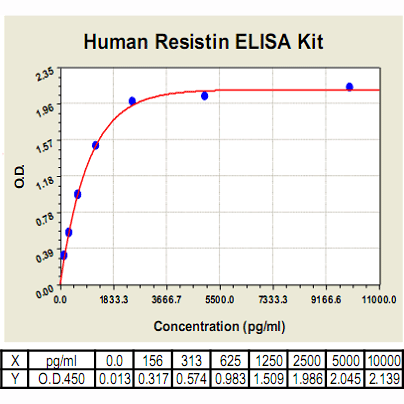Product Sheet CL0581
Description
BACKGROUND Resistin is a 12.5-kDa peptide hormone belonging to a novel class of cysteine-rich secreted proteins termed the RELM/FIZZ (found in inflammatory zone) family. Resistin (also known as FIZZ3 and adipose tissue-specific secretory factor) is adipocyte-specific, down-regulated by antidiabetic drugs, and functionally antagonistic to insulin. RELMα (also known as FIZZ1) is expressed in white adipose tissue, tongue, and lung, where it appears to be involved in inflammatory processes. RELMβ (also known as FIZZ2) is intestine-specific and of unknown function. The family is characterized by a highly conserved, cysteine-rich C terminus in which the spacing of the cysteines is invariant.1
Resistin is a potential link between obesity and insulin resistance or type 2 diabetes. In rodents, resistin is primarily expressed in and secreted from mature adipocytes, with some expression in pancreatic islets and portions of the pituitary and hypothalamus. Its secretion can be up-regulated by several factors, including insulin and glucose. The exposure of rodents, or their cells, to resistin results in decreased response to insulin. This is likely in part due to an upregulation of suppressor of cytokine signaling (SOCS)-3, which interferes with the activation of insulin receptor substrate (IRS)-1.2 However, in humans resistin is expressed primarily by macrophages and seems to be involved in the recruitment of other immune cells and the secretion of pro-inflammatory factors, including tumor necrosis factor (TNF)alpha. Human resistin may interfere with insulin signaling by stimulating the expression of phosphatase and tensin homolog deleted on chromosome ten (PTEN), which dephosphorylates 3-phosphorylated phosphoinositide (PIP3). Resistin also seems to be involved in the development of atherosclerosis in humans by promoting the formation of foam cells and the proliferation and migration of vascular endothelial and smooth muscle cells. Many of the inflammatory related functions of human resistin appear to be regulated by activation of the nuclear factor (NF)kappaB transcription factor.3
Resistin is a potential link between obesity and insulin resistance or type 2 diabetes. In rodents, resistin is primarily expressed in and secreted from mature adipocytes, with some expression in pancreatic islets and portions of the pituitary and hypothalamus. Its secretion can be up-regulated by several factors, including insulin and glucose. The exposure of rodents, or their cells, to resistin results in decreased response to insulin. This is likely in part due to an upregulation of suppressor of cytokine signaling (SOCS)-3, which interferes with the activation of insulin receptor substrate (IRS)-1.2 However, in humans resistin is expressed primarily by macrophages and seems to be involved in the recruitment of other immune cells and the secretion of pro-inflammatory factors, including tumor necrosis factor (TNF)alpha. Human resistin may interfere with insulin signaling by stimulating the expression of phosphatase and tensin homolog deleted on chromosome ten (PTEN), which dephosphorylates 3-phosphorylated phosphoinositide (PIP3). Resistin also seems to be involved in the development of atherosclerosis in humans by promoting the formation of foam cells and the proliferation and migration of vascular endothelial and smooth muscle cells. Many of the inflammatory related functions of human resistin appear to be regulated by activation of the nuclear factor (NF)kappaB transcription factor.3
REFERENCES
1. McTernan, P.G. et al: Curr Opin Lipidol. 17:170-5, 2006
2. Steppan, C.M. & Lazar, M.A.: J Intern Med. 255:439-47, 2004
3. Adeghate, E.: Analyt. and Bioanalyt. Chem. 398:295-312, 2010
2. Steppan, C.M. & Lazar, M.A.: J Intern Med. 255:439-47, 2004
3. Adeghate, E.: Analyt. and Bioanalyt. Chem. 398:295-312, 2010
Products are for research use only. They are not intended for human, animal, or diagnostic applications.
Details
Cat.No.: | CL0581 |
Target Protein Species: | Human |
Range: | 156 pg/ml – 10ng/ml |
Specificity: | No detectable cross-reactivity with other cytokines |
Storage: | Store at 4°C. Use within 6 months. |
ELISA Kits are based on standard sandwich enzyme-linked immunosorbent assay technology. Freshly prepared standards, samples, and solutions are recommended for best results.
Products
| Product | Size | CAT.# | Price | Quantity |
|---|---|---|---|---|
| Human Resistin ELISA Kit: Human Resistin ELISA Kit | Size: 96 wells | CAT.#: CL0581 | Price: $608.00 |

